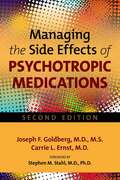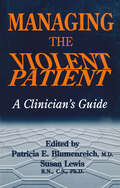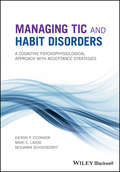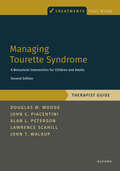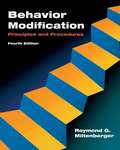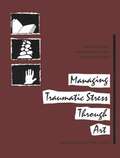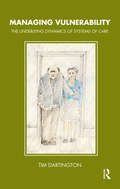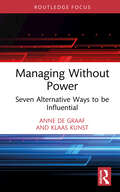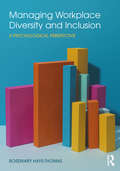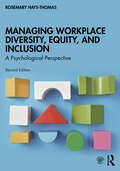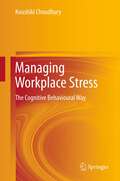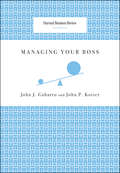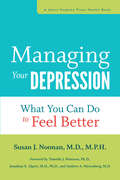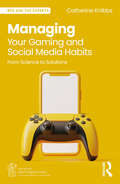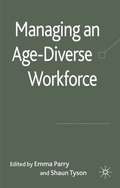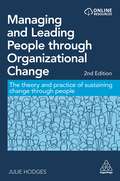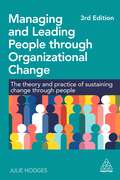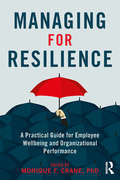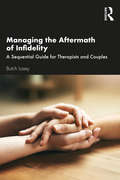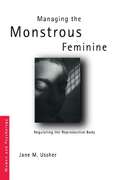- Table View
- List View
Managing The Side Effects Of Psychotropic Medications
by Stephen M. Stahl Joseph F. Goldberg Carrie L. ErnstWhere other psychopharmacology textbooks and, indeed, most internships and residencies in psychiatry lack a solid basis in primary care medicine, Managing the Side Effects of Psychotropic Medications bridges that educational gap, offering a thorough examination of all the effects of taking a psychotropic drug, as well practical clinical advice on how to manage complications that arise. This second edition of the guide features updated information about newer psychotropic agents, as well as new drugs to help manage iatrogenic weight gain, metabolic dysregulation, involuntary movement disorders, and other common problems. New tables and figures have also been added to aid rapid assessment and management, and the self-assessment section has been updated and expanded with more key questions to facilitate knowledge retention. Regardless of their particular expertise, all clinicians will benefit from the rigorous scientific and scholarly discussion they will find in this edition of the consequences of drug therapies they prescribe, the range of available strategies to effectively manage adverse effects, and the scientific and practical implications of their treatment decisions.
Managing The Violent Patient: A Clinician's Guide
by R. N. C. S. Patricia E. Blumenreich M.D. Susan LewisFirst published in 1993. Routledge is an imprint of Taylor & Francis, an informa company.
Managing Tic and Habit Disorders: A Cognitive Psychophysiological Treatment Approach with Acceptance Strategies
by Benjamin Schoendorff Kieron P. O'Connor Marc E. LavoieA pioneering guide for the management of tics and habit disorders Managing Tic and Habit Disorders: A Cognitive Psychophysiological Approach with Acceptance Strategies is a complete client and therapist program for dealing with tics and habit disorders. Groundbreaking and evidence-based, it considers tics and habit disorders as part of the same spectrum and focuses on the personal processes that are activated prior to a tic and habit rather than the tic or habit itself. By drawing on acceptance and mindfulness strategies to achieve mental and physical flexibility in preparing action, individuals can release unnecessary tension, expend less effort and ultimately establish control over their tic or habit. The authors explain how to identify the contexts of thoughts, feelings and activities that precede tic or habit onset, understand how self-talk and language can trigger tic onset, and move beyond unhelpful ways of dealing with emotions - particularly in taking thoughts about emotions literally. They also explore how individuals can plan action more smoothly by drawing on existing skills and strengths, and overcome shame by becoming less self-critical and more self-compassionate. They conclude with material on maintaining gains, developing new goals, and creating a more confident and controlled lifestyle. Managing Tic and Habit Disorders is a thoughtful and timely guide for those suffering from this sometimes all-consuming disorder, and the professionals who set out to help them.
Managing Tourette Syndrome: A Behavioral Intervention for Children and Adults Therapist Guide
by John C. Piacentini John T. Walkup Lawrence Scahill Douglas W. Woods Alan L. PetersonThis therapist guide addresses the treatment of Tourette syndrome (TS) in children and adults. The goal of this 11-session program is to teach the patient effective tic management skills rather than to cure the tic disorder. Complete with step-by-step instructions for running sessions, as well as lists of materials needed, session outlines, and copies of forms necessary for treatment, this therapist guide provides all the information needed to successfully treat tic disorders. Now into its second edition, this well-established treatment protocol is now recognized as a first-line treatment for tics in individuals across the world and outlines the protocol for the Comprehensive Behavioral Intervention for Tics (CBIT). Written by the treatment developers, this book provides not only the technical knowledge of how the treatment can be effectively implemented, but also includes the collected wisdom from nearly 20 years of treating patients with the protocol. This updated protocol is a must have for anyone treating individuals with tic disorders. Also available is an updated and revised corresponding workbook for parents and their children, as well as the original workbook designed specifically for adolescent and adult clients.
Managing Tourism and Hospitality Services: Theory and International Applications
by Gianna Moscardo Bruce Prideaux Eric LawsThe aim of this book is to enhance theoretical and practical understanding of quality management in tourism and hospitality. It provides a benchmark of current knowledge, and examines the range of research methods being applied to further develop tourism and hospitality service management research. It is hoped that this book will stimulate new research questions by highlighting tensions and challenges in the area.
Managing Trauma in the Workplace: Supporting Workers and Organisations
by Noreen TehraniManaging Trauma in the Workplace looks at the impact of trauma not only from the perspective of the employees but also from that of their organisations. In addition to describing the negative outcomes from traumatic exposure it offers solutions which will not only build a more resilient workforce but also lead to individual and organisational growth and development. This book has contributions from international experts working in a variety of professions including teaching, the military, social work and human resources. It is split into four parts which explore: the nature of organisational trauma traumatized organisation and business continuity organisational interventions building resilience and growth. Managing Trauma in the Workplace is essential reading for anyone with responsibility to help and support workers involved in distressing and traumatic incidents as a victim, supporter or investigator.
Managing Traumatic Stress Through Art: Drawing from the Center
by Barry M. Cohen Mary M. Barnes Anita B. RankinThree art therapists have collaborated to produce this unique workbook. Designed especially for trauma survivors, Managing Traumatic Stress Through Art introduces inventive ways to understand, manage, and transform the aftereffects of trauma. This dynamic workbook consists of carefully structured step-by-step art projects, augmented by tear-out images, and writing experiences. The book's first section, Developing Basic Tools For Managing Stress, is devoted to establishing a safe framework for trauma resolution. The second section, Acknowledging and Regulating Your Emotions, helps the trauma survivor to make sense of overwhelming emotional experiences. The final section, Being and Functioning in the World, focuses on self and relational development, leading into the future. <p><p>Managing Traumatic Stress Through Art will inspire survivors to explore the aftermath of traumatic stress as it affects self-image, relationships with others, and functioning in the world. The 26 projects in this book encourage creative growth and help to establish a sense of personal safety, while exploring and honoring feelings of anger, fear, shame, and sadness. The art experiences are broad enough to be of value to survivors of a wide variety of traumatic experiences, ranging from childhood abuse to accidents to disabling mental illness. This workbook offers an opportunity to everyone, regardless of previous experience or artistic talent, to manage symptoms of traumatic stress in a creative, life-affirming way.
Managing Vulnerability: The Underlying Dynamics of Systems of Care (Tavistock Clinic Series)
by Tim DartingtonClinicians, managers and researchers - as well as politicians and religious leaders - are worrying about a lack of compassion and humanity in the care of vulnerable people in society. In this book The author explores the dynamics of care. He argues that we know how to do it, but somehow we seem to keep getting it wrong. Poor care in hospitals and care homes is well documented, and yet it continues. Care for people in their own homes is seen as an ideal, but the reality can be cruel and isolating. The author describes research over forty years in thinking why institutional and community care are both subject to processes of denial and fear of dependency. His examples include children in hospital, people with disabilities living in the community, and the care of older people and those with dementia.
Managing Without Power: Seven Alternative Ways to be Influential
by Anne de Graaf Klaas KunstLargely inspired by the work of the American social psychologist Dr. Claude Steiner and the theory of Transactional Analysis, this book explores alternatives to power and how we can use these to work and manage more effectively, with integrity and joy.Within this book, the authors examine and expand on Steiner’s idiosyncratic views on the role of ‘power’ in our lives and work, which led to a new view of the relationship between management and power. Steiner suggested seven alternative ways to be influential, without the use of power, which include: grounding, passion, control, empathy/love, communication, knowledge, and transcendence. This book explores and describes these seven alternative sources of power in more detail, and how they can be used to produce change and increase the personal power of all, rather than playing power games.This will be a valuable resource for managers and leaders in all types of organizations, as well as for coaches, clinicians, and anyone who is interested in forms of influence other than the use of (autocratic) power.
Managing Work and Relationships at 35,000 Feet: A Practical Guide for Making Personal Life Fit Aircrew Shift Work, Jetlag, and Absence from Home
by Dr. Carina EriksenThis book seeks to contribute to a psychological perspective to aircrew wellbeing and help aircrew to acquire an understanding of how to better manage the many challenges arising from sleep deprivation and frequent absence from friends and loved others at home.
Managing Workplace Diversity and Inclusion: A Psychological Perspective
by Rosemary Hays-ThomasManaging Workplace Diversity and Inclusion bridges the gap between social science theory and research and the practical concerns of those working in diversity and inclusion by presenting an applied psychological perspective. Using foundational ideas in the field of diversity and inclusion as well as concepts in the social sciences, this book provides a set of cognitive tools for dealing with situations related to workplace diversity and applies both classic theories and new ideas to topics such as United States employment law, teamwork, gender, race and ethnicity, sexual orientation, and other areas. Each chapter incudes engaging scenarios and real-world applications to stimulate learning and help students conceptualize and contextualize diversity in the workplace. Intended for upper-level undergraduates as well as graduate students, this textbook brings together foundational theories with practical, real-world applications to build a strong understanding of managing diversity and inclusion in the workplace.
Managing Workplace Diversity, Equity, and Inclusion: A Psychological Perspective
by Rosemary Hays-ThomasManaging Workplace Diversity, Equity, and Inclusion bridges the gap between social science theory and research and the practical concerns of those working in diversity, equity, and inclusion by presenting an applied psychological perspective. Using foundational ideas in the field of diversity, equity, and inclusion as well as concepts in the social sciences, this book provides a set of cognitive tools for dealing with situations related to workplace diversity and applies both classic theories and new ideas to topics such as United States employment law, teamwork, gender, race and ethnicity, sexual orientation, and other areas. Each chapter includes engaging scenarios and real-world applications to stimulate learning and help students conceptualize and contextualize diversity in the workplace. Intended for upper-level undergraduates as well as graduate students, this textbook brings together foundational theories with research-based and practical, real-world applications to build a strong understanding of managing diversity, equity, and inclusion in the workplace.
Managing Workplace Stress: The Cognitive Behavioural Way
by Koushiki ChoudhuryThis book is focussed at those who are working or are about to enter the workplace. According to the book, workplace may be defined as "any environment enabling work to be done". This broader definition will make the workplace include any situation or place where people interact to exchange knowledge and information. The book discusses the various anxiety and stress inducing events that one faces in the workplace and the ways to cope with them, using Rational Emotive Behaviour Therapy (REBT), and Cognitive Therapy (CT). These techniques are the most widely used psychotherapeutic techniques and their effectiveness has been tested scientifically throughout the world. The book attempts to show as to how Cognitive Behaviour Therapy (umbrella term for CT and REBT) can be used to challenge and overcome workplace stress issues such as criticism, abuse, animosity, conflicts, disagreements, insubordination, organisational politics, favouritism, prejudices, discriminations, job uncertainties, extreme work pressures, excessive workloads, poor job designs, job mismatches, role conflicts, role ambiguities, cultural and ethical maladjustments, workplace boredom and anger problems by realistically and accurately interpreting events at the workplace. It includes plenty of real-life stress producing scenarios as examples and specific techniques to challenge them. Moreover, it tries to analyze and solve workplace stress issues in a very lucid, simple and direct manner so that it appeals to and is understood by a wide range of people. The book is based on research and studies in the area of internal marketing, psychological counselling and workplace stress, and is the product of years of surveys and professional interactions in the industry and the academia.
Managing Your Boss
by John P. Kotter John J. GabarroManaging your boss: Isn't that merely manipulation? Corporate cozying up? Not according to John Gabarro and John Kotter. In this handy guidebook, the authors contend that you manage your boss for a very good reason: to do your best on the job--and thereby benefit not only yourself but also your supervisor and your entire company. Your boss depends on you for cooperation, reliability, and honesty. And you depend on him or her for links to the rest of the organization, for setting priorities, and for obtaining critical resources. By managing your boss--clarifying your own and your supervisor's strengths, weaknesses, goals, work styles, and needs--you cultivate a relationship based on mutual respect and understanding. The result? A healthy, productive bond that enables you both to excel. Gabarro and Kotter provide valuable guidelines for building this essential relationship--including strategies for determining how your boss prefers to process information and make decisions, tips for communicating mutual expectations, and tactics for negotiating priorities. Thought provoking and practical, Managing Your Boss enables you to lay the groundwork for one of the most crucial working relationships you'll have in your career.
Managing Your Depression: What You Can Do to Feel Better (A Johns Hopkins Press Health Book)
by Susan J. NoonanA concise, practical guide to managing mood disorders for anyone suffering from these debilitating conditions.As a physician who personally suffers from depression, Susan J. Noonan draws on her own expertise and empathy to create a guide for people who suffer from the disease. Explaining the basics of mental health—including sleep hygiene, diet and nutrition, exercise, routine and structure, and avoiding isolation—Managing Your Depression empowers people to participate in their own care, offering them a better chance of getting, and staying, well. Noonan’s depression management strategies draw on the best available educational resources, psychoeducational programs, seminars, expert health care providers, and patient experiences. The book is specifically designed to be highly readable for people who are finding it difficult to focus and concentrate during an episode of depression. Cognitive exercises and daily worksheets help track progress and response to therapy and provide valuable information for making treatment decisions. A relapsing and remitting condition, depression affects nearly 15 percent of people in the United States. Managing Your Depression will bring depression management strategies to people who do not have access to mental health programs or who want to learn new skills.
Managing Your Gaming and Social Media Habits: From Science to Solutions (BPS Ask The Experts in Psychology Series)
by Catherine KnibbsThe influence of technology on hobbies and leisure time is quickly becoming a regular part of daily life, but how much do we really understand about how or why we’re using it, and its impact on our health? This easy-to-read guide is designed to provide all of the support needed to understand why we use technology the way we do, and how we can recognise when interventions are needed to help master our own technology use.Following an effective Q&A structure and offering a valuable ‘dip in and out’ approach, this book provides expert guidance on all the burning questions related to our technology use, with particular support for those struggling to regulate their own gaming and social media use. It focuses on the science and avoids scaremongering by simply addressing the bits you need to understand, what you can do about your behaviours, and how this can improve your productivity, mental health, sleep, and diet.Helping readers and their families take back control and feel better informed about the future use of technology in our everyday lives, this book is a must read for anyone wanting expert guidance on the issues that matter most.
Managing Your Recovery from Addiction: A Guide for Executives, Senior Managers, and Other Professionals
by Bruce Carruth David F O'Connell Deborah BevvinoLearn how to get sober-and stay that wayGetting and staying sober provides a special set of challenges for professional people-physicians, lawyers, corporate CEOs, accountants, and others-who drive themselves to achieve and succeed in high-pressure surroundings. Managing Your Recovery from Addiction applies business approaches and ideas to the process of planning, implementing, and carrying out programs that really work for professionals in their first year of recovery. This unique self-help book provides guidance to impaired executives and professionals seeking recovery through inpatient and outpatient care, setting strategies for managing conflict, dealing with changing emotions and moods, and developing a solid spiritual program. Managing Your Recovery from Addiction helps professionals develop both short- and long-term programs for dealing with the challenges of maintaining sobriety. The book is based on the authors&’ extensive experience treating impaired business personnel in a variety of settings, including the Caron Treatment Centers and Lifeworks of London, England, an internationally recognized addictions treatment center. Their rational, scientific approach complements ongoing counseling and other treatment approaches to help keep the professional&’s career on track, saving the recovering individual-and his or her employer-significant time and money due to lower productivity, arrested organizational development, absenteeism, and other problems associated with professional level addiction. Topics examined in Managing Your Recovery from Addiction include: a unique view of the 12 Steps for business personnel the dynamics of managerial addiction essential information to prevent relapse to active addiction coping with relapse basic tasks and fundamental recovery steps setting and tracking recovery goals recovery stages 10 tasks to recovery conflict management strategies spiritual development addictions treatment and much more!Managing Your Recovery from Addiction concludes with the O&’Connell Dysfunctional Attitude Survey (ODAS). This book is vital for recovering executives and professionals and is an important resource for addictions and mental health treatment agencies that serve a professional population. It&’s equally helpful for employee assistance program (EAP) personnel who regularly refer professionals for addictions treatment.
Managing an Age Diverse Workforce
by Emma Parry Shaun Tyson.Unique in the multiple approaches that it encompasses, this book includes discussions of both older and younger workers, employer and employee perspectives, generational and age diversity and international comparisons. It includes both conceptual argument and empirical research in order to provide insights into this important area.
Managing and Leading People Through Organizational Change
by Dr Julie HodgesTremendous forces for change are radically reshaping the world of work. Disruptive innovations, radical thinking, new business models and resource scarcity are impacting every sector. Although the scale of expected change is not unprecedented, what is unique is the pervasive nature of the change and its accelerating pace which people in organizations have to cope with. Structures, systems, processes and strategies are relatively simple to understand and even fix. People, however, are more complex. Change can have a different impact on each of them, all of which can cause different attitudes and reactions. Managing and Leading People Through Organizational Change is written for leaders with the key responsibility of managing people through transitions. Managing and Leading People through Organizational Change provides a critical analysis of change and transformation in organizations from a theoretical and practical perspective. It addresses the individual, team and organizational issues of leading and managing people before, during and after change, using case studies and interviews with people from organizations in different sectors across the globe. This book demonstrates how theory can be applied in practice through practical examples and recommendations, focusing on the importance of understanding the impact of the nature of change on individuals and engaging them collaboratively throughout the transformation journey.
Managing and Leading People through Organizational Change: The Theory and Practice of Sustaining Change through People
by Dr Julie HodgesChange in organizations is all about people: it is people who plan, prepare for and implement change, and who are affected by it in the daily course of their work. Yet there is a tendency to focus on quantifiable and often more easily solved technical aspects of implementing organizational change programmes, and ignore the complex ways that these will impact individuals. Providing an evidence-based analysis of change in organizations, Managing and Leading People Through Organizational Change is written for practitioners responsible for change programmes and postgraduate students of organizational change. This updated edition demonstrates the importance of understanding the effects of change on individuals and engaging them collaboratively through the transformation journey. Featuring new material on individual wellbeing and the impact of technological advances on the workplace, this book sets out frameworks, practical approaches and recommendations for communicating with and leading individuals, teams and organizations through change. Full of exercises, interviews and case studies from across the globe, this book is an essential resource for leaders and students enabling them to achieve sustainable benefits of change at work.
Managing and Leading People through Organizational Change: The Theory and Practice of Sustaining Change through People
by Professor Julie HodgesChange in organizations is all about people; it is people who plan, prepare for and implement change and who are affected by it in the daily course of their work. However, there is a tendency to focus on the more technical and quantifiable aspects of implementing organizational change programmes whilst ignoring the complex ways that these will impact individuals. Providing an evidence-based analysis of change in organizations, Managing and Leading People Through Organizational Change is written for senior practitioners responsible for change programmes and postgraduate students of organizational change. This updated edition demonstrates the importance of understanding the impact of developing technologies, including AI, as well as how best to implement sustainability and inclusion in the workplace. With new material on individual wellbeing and the impact of hybrid working, this book sets out frameworks, practical approaches and recommendations for communicating with and leading individuals, teams and organizations through change. Full of exercises, interviews and real-world examples from across the globe, this book is an essential resource for leaders and students enabling them to achieve sustainable benefits of change at work.
Managing for Resilience: A Practical Guide for Employee Wellbeing and Organizational Performance
by Monique F. CraneIn an era of longer hours and shorter contracts, of tighter margins and frequent organizational change, stress can undermine both the mental health and performance of employees. A culture of resilience in the workplace, however, offers the potential to support psychological wellbeing and improve the performance of both people and organizations. This is the first book to provide managers with a guide to fostering psychological resilience within their teams. It synthesises not only the latest cutting-edge research in the area, but also translates this into practical advice for a range of organizational settings. Chapters cover the following important issues: Key personality factors related to resilience How job design and routines can improve employee resilience How to build a resilient team Communicating change and improving teamwork Modelling resilient thinking and behaviour as a leader Selecting the right resilience training for your organisation This is the ideal book for anyone interested in fostering a high-performance and emotionally resilient workforce, whether they are a manager, HR professional or occupational psychologist. Its cutting edge approach will also make it important reading for students and researchers of organizational and occupational psychology.
Managing the Aftermath of Infidelity: A Sequential Guide for Therapists and Couples
by Butch LoseyThis book tackles the challenges that arise from infidelity by helping couples heal through the initial experiences of discovery, providing tools to help partners disclose the details of the affair, manage triggering experiences and obtain forgiveness and reconciliation. Managing in the Aftermath of Infidelity is organized to speak directly to the betraying partner, the betrayed partner, and the therapist independently, offering valuable insights on how each role can assist in making recovery successful. Early chapters direct couples on how to limit potential damage from the fall out of discovery, and subsequent chapters help the couple repair and rebuild a new post-affair relationship. The strategies within this book can be used by the couple alone or as a companion to working with a therapist. Taking the reader sequentially through the essential steps of affair recovery, this text is an essential guide for marriage counselors and their patients.
Managing the Monstrous Feminine: Regulating the Reproductive Body (Women and Psychology)
by Jane M. UssherManaging the Monstrous Feminine takes a unique approach to the study of the material and discursive practices associated with the construction and regulation of the female body. Jane Ussher examines the ways in which medicine, science, the law and popular culture combine to produce fictions about femininity, positioning the reproductive body as the source of women's power, danger and weakness.Including sections on 'regulation', 'the subjectification of women' and 'women's negotiation and resistance', this book describes the construction of the 'monstrous feminine' in mythology, art, literature and film, revealing its implications for the regulation and experience of the fecund female body. Critical reviews are combined with case studies and extensive interview material to illuminate discussions of subjects including: the regulation of women through the body regimes of knowledge associated with reproduction intersubjectivity and the body women’s narratives of resistance. These insights into the relation between the construction of the female body and women's subjectivity will be of interest to those studying health psychology, social psychology, medical sociology, gender studies and cultural studies. The book will also appeal to all those looking for a high-level introduction to contemporary feminist thought on the female body.
